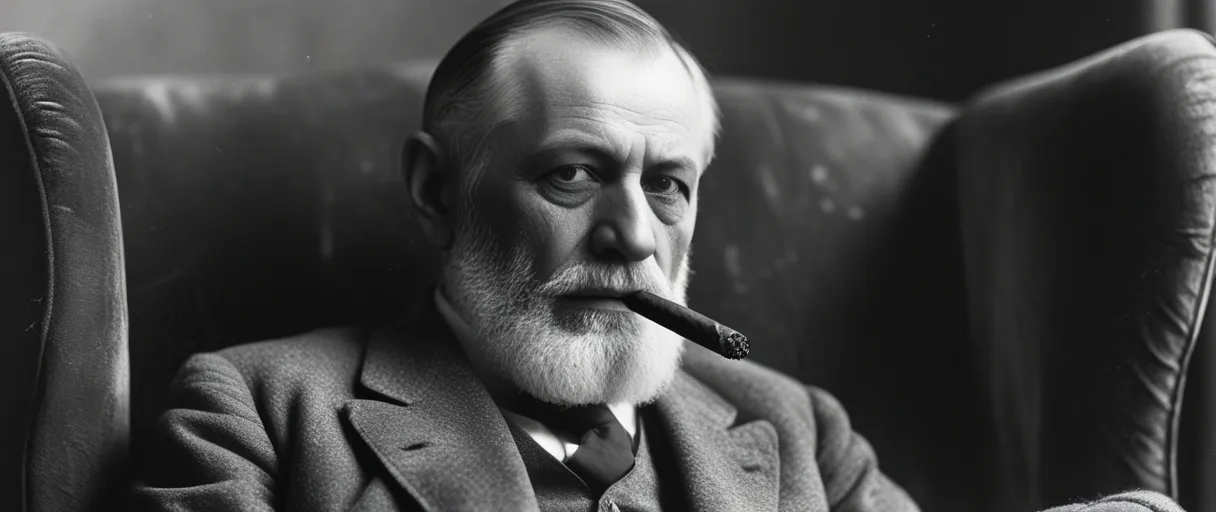
Sigmund Freud
Sigmund Freud, founder of psychoanalysis, profoundly reshaped psychology by uncovering the unconscious mind and exploring internal human conflicts and desires.
Full Name: Sigmund Freud
Died: Bloomsbury, London, United Kingdom on September 23rd, 1939
Notable Works
Sigmund Freud, widely regarded as the father of psychoanalysis, profoundly shaped modern psychology through his groundbreaking and insightful works. Among his most influential books is "The Interpretation of Dreams," a seminal text that delves into the hidden meanings of dreams, positioning them as a window into the unconscious mind. This pioneering work, blending psychological inquiry with philosophical exploration, established dream analysis as a significant therapeutic tool and offered profound insights into human emotional and psychological drives.
Freud's writing frequently explores core themes such as the unconscious mind and the complex relationship between desire, repression, and identity. His theories challenged prevailing notions about human behavior and sparked extensive debate and further research. Other notable works include "Civilization and Its Discontents," a profound reflection on the tension between individual instincts and societal expectations, and "Beyond the Pleasure Principle," wherein Freud introduced the concept of the death drive, expanding our understanding of human motivation and emotional conflicts. Freud's enduring legacy lies in his profound influence on psychology, literature, and broader cultural thought.
Books by Sigmund Freud
Overview & Analysis
Sigmund Freud was a revolutionary thinker whose theories irrevocably transformed the landscape of psychology and human self-perception. Born in the mid-19th century, Freud emerged as the father of psychoanalysis, pioneering the exploration of the unconscious mind and its hidden influence on human behavior. His seminal work, "The Interpretation of Dreams," shattered prevailing notions by suggesting that dreams were not random but deeply symbolic, providing a window into repressed desires and internal conflicts. Freud's bold examinations of psychological turmoil, emotional honesty, and ethical autonomy challenged restrictive societal norms and dogmatic moral structures, advocating instead for intellectual freedom and rigorous self-examination. Living amidst the dynamic intellectual climate of late 19th- and early 20th-century Europe, his insights into sexuality, childhood experiences, and unconscious motivations fundamentally reshaped modern understandings of human nature. Freud's lasting influence extends far beyond psychology, permeating literature, philosophy, and cultural discourse, as he continues to inspire critical thought about the complexities of the human psyche.
Back to TopInfluences & Worldview
Sigmund Freud was a groundbreaking philosophical thinker whose work profoundly reshaped the way humans understand themselves. Living in the vibrant intellectual climate of late 19th and early 20th century Europe, Freud delved deeply into the uncharted territories of psychological conflict and turmoil, revealing the hidden motivations and unconscious desires that shape human behavior. His exploration of internal moral evolution emphasized emotional honesty, sincerity, and ethical autonomy, encouraging individuals to examine their innermost selves with courage and authenticity. Freud was a tireless social commentator, challenging repressive social norms and critiquing the restrictive morality of his time. He advocated for intellectual freedom, tolerance, and critical thinking, becoming a staunch critic of dogmatic structures—whether religious, authoritarian, or societal. Freud's commitment to reason and his cautious approach toward unchecked scientific ambition highlight his nuanced understanding of humanity's potential and limitations, making his legacy enduringly influential in contemporary psychological and philosophical thought.
Notable Characters
Sigmund Freud, though primarily known as a pioneering psychoanalyst rather than a traditional novelist, crafted memorable figures through his influential case studies and theoretical writings. Characters such as Dora, famously analyzed in his "Fragment of an Analysis of a Case of Hysteria," vividly showcase Freud's interest in the inner workings of the unconscious mind, repressed desires, and psychological conflicts. Similarly, Little Hans, the young subject of Freud's detailed exploration into childhood phobias and anxieties, provides another compelling example of Freud's emphasis on early developmental influences and unconscious symbolism. Freud's characters are distinctive in their psychological complexity, often characterized by profound inner conflicts, hidden motivations, and deeply repressed memories. These individuals embody his broader themes of sexuality, dreams, and the unconscious, reflecting Freud's worldview that human behavior is significantly shaped by hidden psychological forces. Emerging from the intellectually vibrant yet politically turbulent Vienna of the late 19th and early 20th centuries, Freud's characters eloquently illustrate the anxieties and neuroses reflective of his era's cultural tensions and shifting societal norms.
Back to TopThemes of Focus
Sigmund Freud consistently explored the intricate dynamics of the human psyche, focusing notably on themes of subconscious desire, dream interpretation, and psychological repression. Central to his work is the notion that the unconscious mind profoundly shapes human behavior, often through hidden desires and unresolved conflicts. Freud's exploration of dreams, as seen in his seminal work, "The Interpretation of Dreams," underscores his belief in dreams as gateways to understanding suppressed emotions and internal struggles.
Additionally, Freud delved into themes of sexuality and childhood experiences, suggesting that early developmental stages significantly impact adult personality and mental health. These secondary themes reinforce his primary emphasis on subconscious processes, highlighting how formative experiences can manifest as psychological tension or neurosis later in life. Freud's theories reflect the broader intellectual currents of early 20th-century Vienna, marked by a shift toward introspection and a questioning of traditional morality, thus situating his psychoanalytic approach within the historical context of modernist thought and its critical examination of societal and personal identity.
Back to TopLegacy & Impact
Sigmund Freud's pioneering insights into the human psyche have profoundly reshaped literature, philosophy, and social discourse. His revolutionary theories regarding the unconscious mind, dreams, and inner conflicts provided a new vocabulary for authors and artists exploring complex human motivations and psychological depth, influencing literary modernism and existential philosophy. Freud's work challenged traditional views of human morality, prompting critical reflection on social norms, sexuality, and individual autonomy.
Today, Freud's concepts remain influential across academic curricula, from philosophy and literature to psychology and cultural studies. His theories continue to inspire literary analysis, character development, and narrative structures, underscoring universal themes of psychological struggle, identity, and ethical dilemmas. Additionally, Freud's emphasis on emotional honesty and ethical autonomy resonates in contemporary debates on mental health, personal freedom, and societal repression.
Nevertheless, Freud's legacy is not without controversy; critiques of his methods, gender assumptions, and scientific rigor have spurred ideological shifts and reinterpretations of his work. Despite these challenges, Freud’s enduring relevance is evident in ongoing scholarship, psychoanalytic practices, and cultural adaptations, affirming his status as a transformative figure whose ideas continue to shape modern intellectual and social landscapes.
Back to TopConclusion
Sigmund Freud's groundbreaking insights into human psychology continue to resonate deeply in contemporary society, profoundly influencing both literary traditions and broader cultural conversations. His courageous exploration of psychological conflict, ethical autonomy, and emotional sincerity has shaped narrative techniques, compelling authors to delve into complex inner worlds and nuanced character portrayals. By encouraging rigorous introspection and challenging societal norms, Freud's work has ushered in an enduring tradition of literature that bravely confronts the intricacies of the human condition. Modern readers will find in Freud's writings not only historical curiosity but timeless wisdom, fostering a deeper understanding of themselves and the world around them. His enduring legacy underscores the importance of intellectual freedom, critical thinking, and emotional honesty—qualities as vital for contemporary society as they were during Freud's own lifetime.
Back to Top